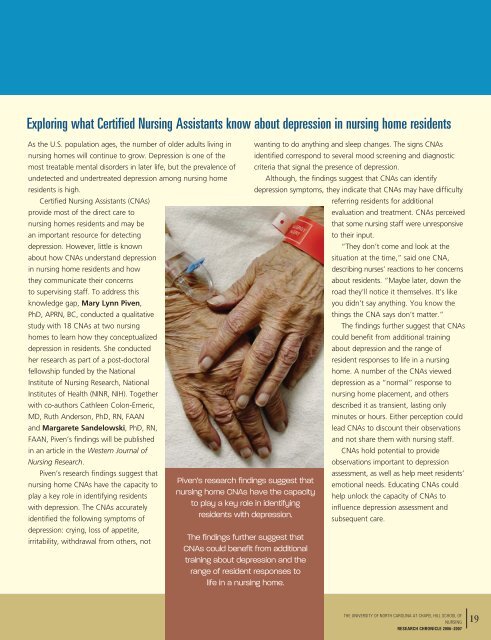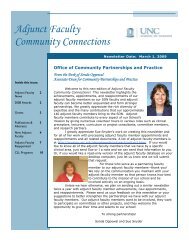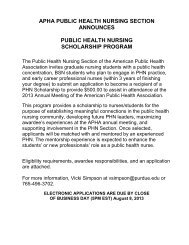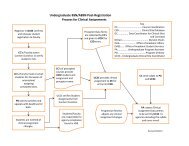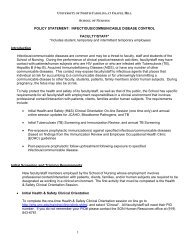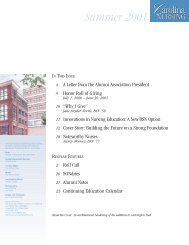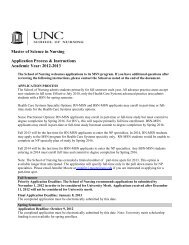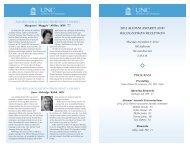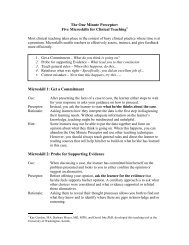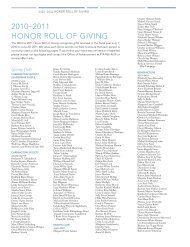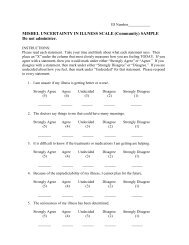Research Chronicle, 2006 - School of Nursing - University of North ...
Research Chronicle, 2006 - School of Nursing - University of North ...
Research Chronicle, 2006 - School of Nursing - University of North ...
Create successful ePaper yourself
Turn your PDF publications into a flip-book with our unique Google optimized e-Paper software.
Exploring what Certified <strong>Nursing</strong> Assistants know about depression in nursing home residents<br />
As the U.S. population ages, the number <strong>of</strong> older adults living in<br />
nursing homes will continue to grow. Depression is one <strong>of</strong> the<br />
most treatable mental disorders in later life, but the prevalence <strong>of</strong><br />
undetected and undertreated depression among nursing home<br />
residents is high.<br />
Certified <strong>Nursing</strong> Assistants (CNAs)<br />
provide most <strong>of</strong> the direct care to<br />
nursing homes residents and may be<br />
an important resource for detecting<br />
depression. However, little is known<br />
about how CNAs understand depression<br />
in nursing home residents and how<br />
they communicate their concerns<br />
to supervising staff. To address this<br />
knowledge gap, Mary Lynn Piven,<br />
PhD, APRN, BC, conducted a qualitative<br />
study with 18 CNAs at two nursing<br />
homes to learn how they conceptualized<br />
depression in residents. She conducted<br />
her research as part <strong>of</strong> a post-doctoral<br />
fellowship funded by the National<br />
Institute <strong>of</strong> <strong>Nursing</strong> <strong>Research</strong>, National<br />
Institutes <strong>of</strong> Health (NINR, NIH). Together<br />
with co-authors Cathleen Colon-Emeric,<br />
MD, Ruth Anderson, PhD, RN, FAAN<br />
and Margarete Sandelowski, PhD, RN,<br />
FAAN, Piven’s findings will be published<br />
in an article in the Western Journal <strong>of</strong><br />
<strong>Nursing</strong> <strong>Research</strong>.<br />
Piven’s research findings suggest that<br />
nursing home CNAs have the capacity to<br />
play a key role in identifying residents<br />
with depression. The CNAs accurately<br />
identified the following symptoms <strong>of</strong><br />
depression: crying, loss <strong>of</strong> appetite,<br />
irritability, withdrawal from others, not<br />
Piven’s research findings suggest that<br />
nursing home CNAs have the capacity<br />
to play a key role in identifying<br />
residents with depression.<br />
The findings further suggest that<br />
CNAs could benefit from additional<br />
training about depression and the<br />
range <strong>of</strong> resident responses to<br />
life in a nursing home.<br />
wanting to do anything and sleep changes. The signs CNAs<br />
identified correspond to several mood screening and diagnostic<br />
criteria that signal the presence <strong>of</strong> depression.<br />
Although, the findings suggest that CNAs can identify<br />
depression symptoms, they indicate that CNAs may have difficulty<br />
referring residents for additional<br />
evaluation and treatment. CNAs perceived<br />
that some nursing staff were unresponsive<br />
to their input.<br />
“They don’t come and look at the<br />
situation at the time,” said one CNA,<br />
describing nurses’ reactions to her concerns<br />
about residents. “Maybe later, down the<br />
road they’ll notice it themselves. It’s like<br />
you didn’t say anything. You know the<br />
things the CNA says don’t matter.”<br />
The findings further suggest that CNAs<br />
could benefit from additional training<br />
about depression and the range <strong>of</strong><br />
resident responses to life in a nursing<br />
home. A number <strong>of</strong> the CNAs viewed<br />
depression as a “normal” response to<br />
nursing home placement, and others<br />
described it as transient, lasting only<br />
minutes or hours. Either perception could<br />
lead CNAs to discount their observations<br />
and not share them with nursing staff.<br />
CNAs hold potential to provide<br />
observations important to depression<br />
assessment, as well as help meet residents’<br />
emotional needs. Educating CNAs could<br />
help unlock the capacity <strong>of</strong> CNAs to<br />
influence depression assessment and<br />
subsequent care.<br />
THE UNIVERSITY THE UNIVERSITY OF NORTH OF CAROLINA NORTH CAROLINA AT CHAPEL AT HILL CHAPEL SCHOOL HILL OF SCHOOL NURSING OF<br />
RESEARCH CHRONICLE <strong>2006</strong>–2007 NURSING<br />
RESEARCH CHRONICLE <strong>2006</strong>–2007<br />
19


